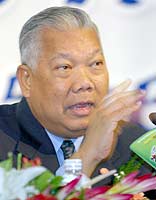Thai prime minister holds tough in face of protest crisis
Bangkok -  Thai Prime Minister Samak Sundaravej on Sunday vowed to stay on in his post despite having lost Government House - the seat of his administration - to protesters for the past six days.
Thai Prime Minister Samak Sundaravej on Sunday vowed to stay on in his post despite having lost Government House - the seat of his administration - to protesters for the past six days.
"I came to power in accordance with the law," said Samak, addressing his weekly "Talking Samak Style" television program. "I have done nothing wrong."
The prime minister has approved a special joint session of the Lower and Upper Houses of Parliament Sunday to find means of defusing Thailand's latest political crisis in which the government has seen their offices seized by thousands of demonstrators from the People's Alliance for Democracy (PAD), a loose coalition of conservative groups who are calling for Samak's resignation and the dissolution of parliament.
Samak, who heads the People Power Party (PPP), received a political boost Saturday night when his coalition partners confirmed their support for the besieged premier at a press conference.
The 73-year-old veteran politician was also granted an audience with Thai King Bhumibol Adulyadej Saturday evening at the monarch's palace at Hua Hin beach resort,
150 kilometres south-west of Bangkok. Samak appeared self-confident after the royal audience.
"Fear can cause damage, but I am not afraid," said Samak in his weekly talk to the nation.
He blasted the PAD for breaking the law in seizing Government House on Tuesday, and trying to create a "spark" to bring down the government.
The PAD's campaign to bring down the Samak government gained momentum on Friday when police tried to forcefully remove the protestors from Government House.
The show of police force prompted PAD followers to raid and shut down three popular airports in Phuket, Hat Yai and Krabi, all in southern Thailand. Phuket and Krabi airports were still closed to traffic Sunday, leaving scores of foreign tourists stranded.
The labour union of the State Railways of Thailand also shut down several routes nationwide in a show of support for the PAD.
The police were forced to retreat, leaving the PAD in control of Thailand's seat of government over the weekend.
On Friday, Samak, who is also defence minister, reportedly wanted to declare a state of emergency to deal with the PAD protest but the proposal was rejected by Army chief General Anupong Paojinda.
Political analysts say Samak faces a dilemma in dealing with the PAD, which is openly pro-monarchist, because the military will not use force in disbanding the demonstration.
The PAD is a political movement that was launched as a spearhead to topple former premier Thaksin Shinawatra who was eventually ousted by a military coup on September 19, 2006.
Its leaders advocate a return to Thailand's old-style democracy, favouring a lead role of the bureaucracy, the military and appointed office holders over elected members of parliament.
It is deemed a conservative reaction to the populist policies of Thaksin and the Samak's PPP, that have proved successful in winning elections by gaining the support of Thailand's urban and rural poor.
The movement has won the support of many middle-class Thais who are fed up with the corruption and abuses of power that are part and parcel of elected governments in Thailand.
The Samak-PAD showdown is seen by some analysts as a crucial test for Thailand's democratic system, which can be characterized as a see-saw between elected governments and governments headed or appointed by the military.
"If the PAD succeeds in ousting Samak, it will be a huge setback for Thai democracy," said Thitinan Pongsudhirak, director of the Institute of Security and International Studies at Bangkok's Chulalongkorn University. "It will be the crowning success for the right-wing conservative contingent who are against election- based democracy." (dpa)